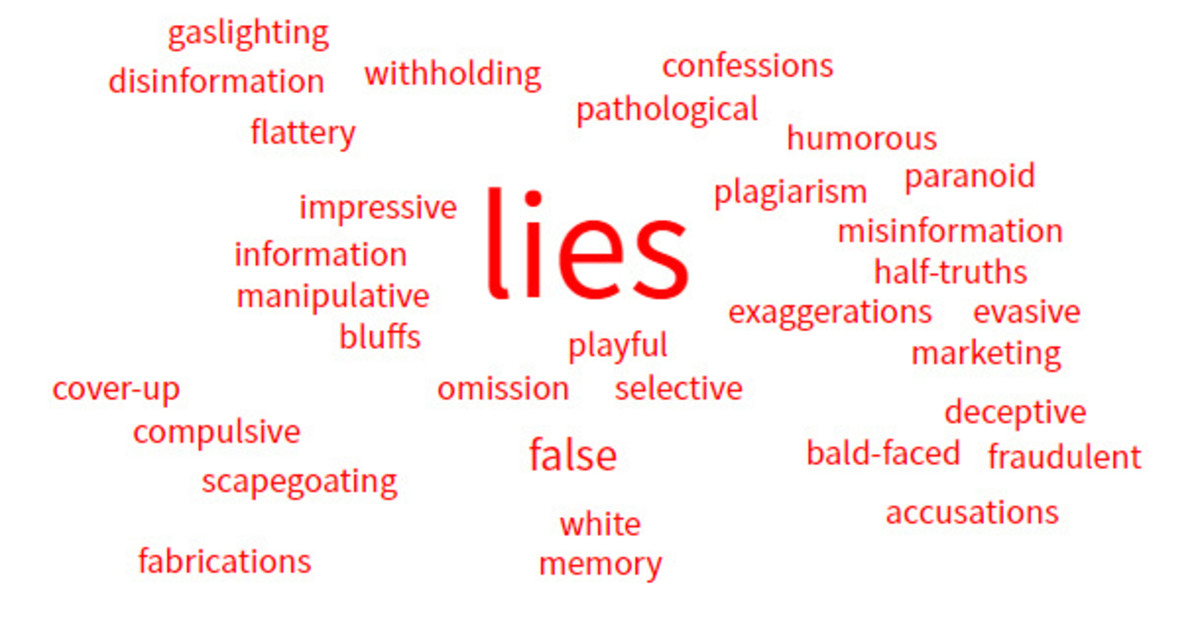Online Dating & Relationships: Love, Lies, and Loss

Would You Want to be Friends with that Person?
Online dating and social networking have both transformed the way we develop our friendships and romantic relationships, but those who later meet their Internet acquaintances in person are often surprised at having been deceived.
What kind of lies would make you not want to meet someone in person?
Men frequently observe that women are older or weigh more than they were led to believe. Another common complaint is that prostitutes may pose as available singles when in fact, they're anything but. Meanwhile, women find that men claiming to be single may be quite committed to another relationship. Nigerian scams profligate over dating sites and social networks, defrauding naïve, kind people out of many thousands of dollars annually.
Liars have a tremendous advantage when it comes to digital interactions, though deception has been present in social interactions since mankind first walked on two feet. We want to make a good first impression, be likable, and get what we want.
Because frequent communication with a stranger through chat, e-mail, or text messaging can, and often does, lead us to developing feelings for a person we've never met, we would benefit from asking ourselves a couple of questions.
- What kind of deception is a deal-breaker for me?
- Would I remain friends with a person who tells white lies?
- Do I value this friendship enough to verify whether this person is truthful with me?
You can protect yourself from some of the common pitfalls of online relationships and friendships if you learn some tips and techniques to detect liars before you invest too much emotion, and to open offline avenues of communication if they pass your evaluation.
All Online Relationships are Prone to Breakage
If you've been a mouse-clicker since way-back-when, you've probably experienced times when people you've known suddenly turned silent. It may have been someone you talked with frequently on a message board who lives halfway around the world or someone with whom you never exchanged a single word but followed diligently because they posted memorably status updates on Facebook. It might be someone in your gaming network who wasn't especially close, but proved helpful to your experiences.
Whatever the case, the article "Meeting People on the Internet" can help you make the most of online friendships that have not yet blossomed into face-to-face ones.

Be an Online Lie Detector
When your online interest is for romantic purposes, you have more reason to be diligent.
Your love interest might be long distance and inaccessible for months, even years. Wouldn't you rather find out if they're a liar before you've exchanged your deepest secrets and greatest fears? Unfortunately, it's tricky to do over a digital medium that lacks non-verbal clues. Was she being funny? Does he sound angry?
Skype and video chat can re-introduce some of these contextual cues, but they cannot fill in information that's well beyond non-verbal expression. If you were right there, would you see photos of her ex on the wall? Would his furniture and car look like he really does make the $100,000 he claims to earn each year?
Researchers from the University of Wisconsin - Madison now report that there are clues in a person's profile that can help you determine if they're telling the truth or not. Janice Wood, an associated news editor for Psych Central, reported what Catalina Toma, Ph.D., and Jeffrey Hancock, Ph.D., found:
- About 80% of people lied to some extent. Weight, age, and height were the most common deceptions researchers found in the 78 profiles studied.
- Liars use brief profiles to avoid getting caught when their stories don't match what they may say later.
- People who avoided using the word "I" to describe themselves were likeliest to lie and to have more significant lies.
- Liars flipped from assertive phrases like "happy" to more vague terms, like "not sad." This "flip of language (is) a hedge, Toma said, against weaving a more tangled web of deception."
- Volunteers asked to rate the profiles for trustworthiness were not able to identify liars effectively. “They might as well have flipped a coin. They’re looking at the wrong things,” she said.
Source: Detecting Online Liars (PsychCentral)
Why Lies Happen, and How We Miss Them
Toma's summary of the volunteers' misperceptions isn't the first study that reveals just how bad we are at recognizing deception - even when we're face-to-face with a liar. Even though body language can reveal dishonesty, many of the cues are unreliable. They can be too subtle to perceive. Chronic deceivers and sociopaths (people who lack a conscience) may train themselves to control their voluntary responses, such as whether they look their victim in the eye when telling a fabrication.
In addition, we lie to others and get lied to all the time, even if we try to be genuine and honest. What one person considers tactful can make another person feel deceived. We know that brutal honesty can be, well, brutal, and result in very unpleasant consequences for ourselves, so we adjust our messages.
The kicker is, we must lie in order to function in society! Imagine asking a pal what they had for lunch and they replied, "Well, I had a double cheeseburger that had two four-ounce patties, a piece of lettuce, chopped onions, two slices of tomatoes tomatoes, and approximately half a teaspoon of catsup, a red container with a yellow M that contained twenty-seven fried potato segments that were sprinkled with salt, and..." If they simply said they'd eaten hamburger, you'd be more satisfied with their abbreviated answer than if they'd given the whole truth. Indeed, you'd think they were crazy if they didn't filter out much of the detail.
We only feel concerned when deception can produce results that may harm us.
Fortunately, as our knowledge of deception increases, we gain additional tools to identify those things that are harder to control. To better detect when people are lying to us (or when we're lying to ourselves, which is sometimes worse!) take a look at these highly-rated guides:
Put Deception in its Place

More Ways to Catch a Thief... Err... Liar
Other techniques can help you discover when potential suitors may be lying have proven controversial, perhaps because they're remarkably effective.
- Google 'Em! Use the "real" name they give you and the user name they use on the site where you met. You may find tax records, court cases, news stories, and more.
- Google 'Em Again! You can set up Google Alerts to receive ongoing notifications about your searches. If their name doesn't appear today, but suddenly is featured somewhere next week, you'll know it.
- Find 'Em, too! Check out PeopleFinders to see if their name appears with someone else's name in public records. It's free to do a basic search, and sometimes identifies others by relationships. For instance, if you do a search for John Smith in Podunk, California (made up names), you may see "Mary Smith (Wife)" under the possible relationships column. For a fee, you can obtain more information on just about anyone. (A word of caution: relationships reported may be outdated or contain incorrect information, so this is simply an investigative tool that can be used to evaluate if you're getting the full story.)
Some people may feel this invades their privacy, so be prepared for possible repercussions if you choose to use one or more of these methods.
Other Relationship Topics by Kathy Batesel
- Surprising Facts about Facebook and Self Esteem
Self-esteem affects how users benefit from Facebook, according to recent studies. People with low self-esteem may be especially vulnerable. - How to Capture Attention with Your Online Dating Profile
Specific steps to make your online dating profile more attractive and memorable. - Online Dating: To Pay or Not to Pay
Should you pay to join an online dating site? This review provides an overview of what you'll find at the most popular online dating services. - Social Media & Breakups
When it comes to social media sites like Facebook, should you stay friends with an ex? This article offers points to consider when you're faced with making that decision.





